I loved the activities
are tpercepts
THX
Nouns are essential for the Portuguese language. They are words that give names to different feelings, beings, qualities, places and much more. They can be classified as follows: proper, common, simple, composite, primitive and derived. Now let's talk more about activities with primitive nouns and derivatives.
Primitive nouns are made up of words that are not derived from any other. For example: stone, house, iron, good, coffee, glass and more. Derived nouns, on the other hand, are formed by words that originate from some other. For example: quarry, big house, blacksmith, goodness, coffee plantation, glassware and much more.



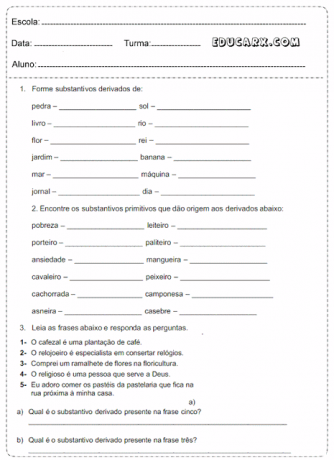


Below we have selected some exercises involving all the types of nouns mentioned above. All of them can be applied in the classroom or as homework. Teachers can take advantage of all the tips.
1) Circle primitive nouns and underline derived nouns.
book – shoe – iron – stone – blacksmith bakery – mason – bookseller – bread – stone shoemaker – bookstore
2) Write a derived noun for each primitive noun below:
the rain:
b) stone:
c) shoe:
d) ink:
e) fruit:
f) machine:
g) land:
3) Classify the highlighted nouns according to the code:
1. Proper noun
2. Concrete noun
3. Abstract noun
"Rita killed our love For revenge, no inheritance left her She didn't take a penny Because she didn't have to But she caused damage and loss." (Chico Buarque de Holanda)
a) ( ) Rita
b) ( ) love
c) ( ) revenge
d) () penny
e) () losses
f) ( ) damage
4) Complete the sentences below with collective nouns:
a) A set of stars is a
b) The mountain collective is
c) The collective of maps is
d) Many birds in the sky form a
e) Many insects or many bees form a
f) Many planes in the sky form a
g) Many fish together form a
h) The tree collective is
Did you like it? Share this post on your social network
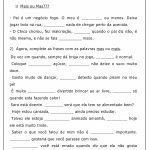 ACTIVITY IDEAS ABOUT BUT AND MORE
ACTIVITY IDEAS ABOUT BUT AND MORE
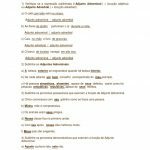 Activities on Adjunct Adjuncts for 7th grade
Activities on Adjunct Adjuncts for 7th grade
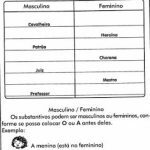 MALE AND FEMALE NOUN ACTIVITIES
MALE AND FEMALE NOUN ACTIVITIES
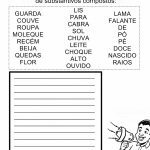 Activities With Simple and Compound Nouns
Activities With Simple and Compound Nouns
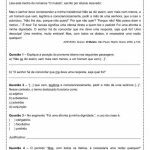 Portuguese Activities About Pronominal Placement
Portuguese Activities About Pronominal Placement
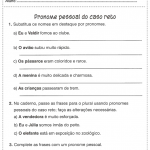 PERSONAL PRONOUN ACTIVITY TIPS
PERSONAL PRONOUN ACTIVITY TIPS
I loved the activities
are tpercepts
THX
This site uses Akismet to reduce spam. Learn how your comment data is processed.

